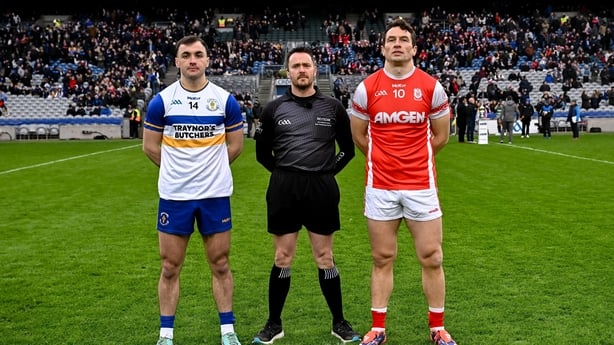Faster, cleaner and an all-round more enjoyable experience – experienced inter-county referee Paddy Neilan has said that the club championship season has been a positive one for all involved under the new Football Review Committee rules.
The St Faithleach’s man is fresh off the back of a long county season – that portion of the year ended as a sideline official for Kerry’s All-Ireland SFC semi-final win over Tyrone – and he was straight back into the club action in Roscommon with two rounds completed in their three-group system.
What’s struck him most is the insignificant difference between how county players and club players have adapted to the enhancements.
“I spoke to one or two clubs about the rules, they’d asked me to speak to them, and it was incredible how tuned in players were to the rules,” he told RTÉ Sport.
“Maybe it’s a generation thing with young lads but 20 years ago you’re not too concerned with the rules, but they’ve had the year watching the county players adapting to the new rules and have no doubt learned a lot from seeing how they react to them.
“It’s been broadly similar; the players really have embraced it in the club championships. The players have really just gotten on with it.
“The attitude has been one of being completely open to it. It suggests they weren’t enjoying it at club level as much in past years.”

Paddy Neilan was referee for the last adult club game under the old rules – Cuala’s All-Ireland final win over Errigal Ciarán at Croke Park
Neilan has the distinction of being the last referee to officiate an adult club game under the old rules when Cuala defeated Errigal Ciarán in January’s All-Ireland final, so he is well placed to compare the old product and the new.
There is no doubting that it’s a different one too with former Tyrone player Paul Donaghy finishing with 0-20 for Dungannon against Trillick last weekend as he kicked nine two-pointers.
While doubts remain over the awarding of orange flags for frees outside the arc, Donaghy’s astonishing tally added another talking point, one thing that can’t be argued is the reduction of dissent in the club game.
Much of that has been attributed to the heavily penalties dished out for dissent, but Neilan feels that it’s another rule that is equally responsible for calming the protests that had often been directed towards officials at club level.
“With the solo and go, there’s a lot less messing going on,” Neilan continued.
“Players are just getting on with it and the game’s away, it leads to a lot less confrontation, it leads to a lot less dissent. When a free was given in the past, they’d air their grievance – they don’t have time to do that now, the opposition are away.
“If a player is standing around to argue, even under the old rules, he’s not concentrating on what he should be doing. Now they definitely can’t do that.”
As the pressure ramps up, Neilan does believe the club players, as a whole, still have to face their stiffest challenge yet – dealing with the new rules in live or die football with knockout formats now dormant in every county with the exception of Tyrone.

Dungannon’s Paul Donaghy (L) scored 0-20 last weekend against Trillick
“As the games progress it’s going to be a challenge, no doubt.
“As we get into it, like Round 3 in Roscommon, you’ll see more on the line.
“The inter-county players picked it up very quickly and the club players will too, but as we go into knock-out there’ll be those big calls.
“Referees aren’t going to get everything right and players aren’t going to get everything right, but I think the will is there amongst the players to embrace it compared to previously.”
On Friday night, Neilan was in Kilbride to oversee the Roscommon SFC clash between Western Gaels and Elphin.
He’ll be busy elsewhere in the county in the coming weeks, the referee pool in Roscommon is small like most counties. Neilan argues that one of the most important outcomes of the new enhancements is that the game is now more attractive for potential new referees.
“We’ve a better chance of recruiting because that’s always a problem. We’ve a better chance of retaining too.
“There’s not the same hassle, not the same verbals, from the sideline and the players.
“We see the headlines every year about counties looking for referees, it comes from a county board meeting that they’re struggling for numbers; this may be a by-product of the new rules and why they were brought in, but if it’s more enjoyable then it’s more enjoyable for everyone and you can keep the numbers you have and possibly add to them.”

